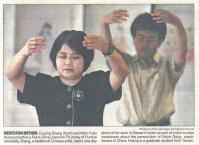Thursday morning, 10 people stood silently in two lines in a makeshift gallery in Purdue University's Stewart Center, their heads down, eyes closed, in deep meditation. Slowly, fluidly, their arms raised and lowered, as the participants surrounded themselves with serenity while puling energy through every part of their bodies.
The meditators credited the practice of Falun Gong for bringing tranquility to their minds, comfort to their bodies and peace to their lives. In China, birthplace of most the meditators, Thursday's simple act could bring penalties as severe as death.
The group was gathered to welcome artist Cuiying Zhang, who presented a one-day exhibition of her artwork in Stewart Center. She also took the opportunity to speak out against the Chinese government's persecution of practitioners of Falun Gong, which she said changed her life.
Falun Gong was introduced to most Chinese in 1992, but was [later] prohibited by president Jiang Zemin. For practicing the meditation, citizens can be imprisoned, tortured or executed.
"The principles of truthfulness, compassion and forbearance are so great that if everyone can follow the practice, then the whole society could benefit and there would be no violence," Zhang said through her translator.
Zhang was imprisoned for eight months in 2000 and, since then, has traveled the world garnering support for practitioners of Falun Gong.
Zhang was imprisoned after meeting with Chinese officials and espousing the benefits of Falun Gong. She said she was held in a male prison and was subjected to hard labor, torture and humiliation. After eight months she was released with the assistance of the Australian government and consulate in Shanghai.
"When I was put in jail, all the cops told that they had no time to find criminals, but instead must spend all of their time tracking down practitioners of Falun Gong," said Zhang, now an Australian citizen.
Zheng, a climate researcher in Purdue's Department of Earth and Atmospheric Sciences, said he thinks the Chinese government has worked so hard to stop Falun Gong because the practice has spread so quickly in popularity [...]
In a recent trip to China, he and his family, including his 2-year-old son, were arrested for practicing Falun Gong and held for an entire winter day outside, with nothing to eat or drink.
"I really enjoy this practice; it's so beautiful. Everything changes," he said. " I think that's the main reason why the government has attacked it."
For Zhang, the practice has not only helped her find inner peace, but has helped her body achieve peace as well.
In 1997, she was struck by severe rheumatoid arthritis. She suffered pain so intense that she could not stand or walk and could only eat and drink with assistance. She said it was the consensus of doctors that she would never regain the ability to paint. Later that year, she turned to Falun Gong in an attempt to ease her pain.
"When I began this wonderful spiritual practice...something unbelievable happened," she said. " My arthritis completely disappeared shortly after I began. I was able to paint again."
Zheng said practicing Falun Gong has helped to deal with the stress of research and deadlines. The most important part of the practice, he said, is not the physical movement and exercise but the mental cleansing.
"Falun Gong teaches that the true, original state of human beings is truthfulness, compassion and forbearance," he said. "When you deviate from that, you are not in alignment with universe. You must give up bad thoughts, thoughts of jealousy, anger, resentment.
"Only when you have a serene mind can you experience the meditation of Falun Gong. Just because you are doing the same movements, you will not experience the serenity. It will be like any other exercise, like riding a bicycle."
While traveling the United States, Zhang is donating a portion of proceeds from the sale of her art to the children of victims of the terrorist attacks of Sept. 11. She said that is a way for her to contribute to this country and the help that Americans give to sufferers of human rights violations throughout the world.
á
Category: Falun Dafa in the Media






